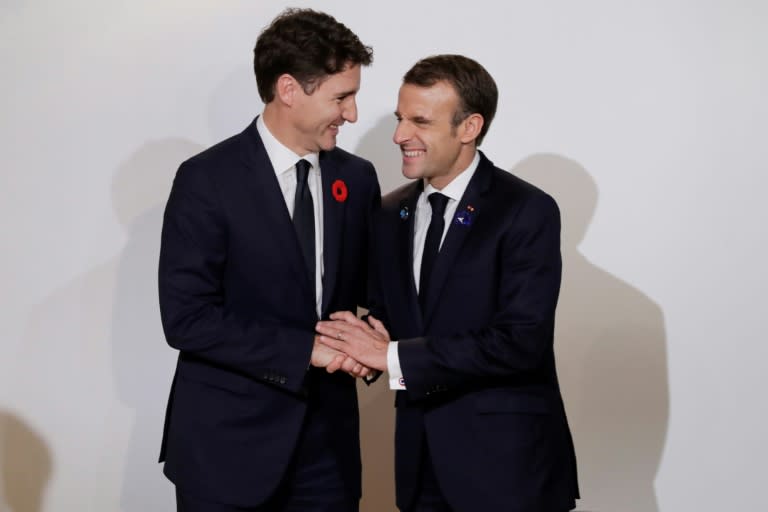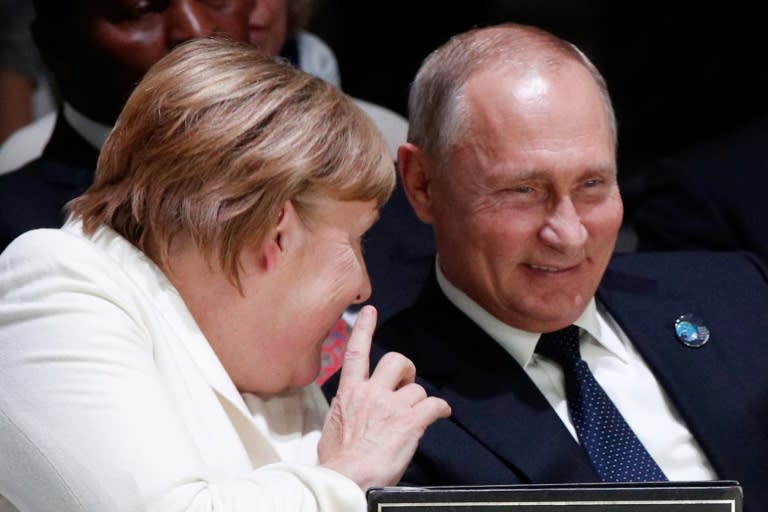Can Macron's 'Davos for democracy' make a difference?
It was billed as a "Davos for democracy". But will the newly launched Paris Peace Forum, the latest addition to international conferencing, have an impact? Conceived by French leader Emmanuel Macron, the Forum is intended to be part of the fightback against nationalism, with its format inspired by the annual business meeting in the Davos ski resort in Switzerland. The event opened Sunday, with speeches by Macron, German Chancellor Angela Merkel and UN chief Antonio Guterres who warned in turn about the dangers of Trump-style populism. The idea is that the Paris event, which began symbolically on the centenary of the end of World War I, becomes an annual gathering to discuss democracy and international cooperation. "We have put on leaders' agenda the fact that every year, we will talk about multilateralism and our collective interests here," chief organiser Justin Vaisse told AFP. The remaining days -- the Forum ran until Tuesday -- featured round-table discussions on topics from gender inequality to the need for new global environmental accords. One hundred and twenty projects, most of them run by NGOs, were given space in an exhibition area at the entrance to the former slaughterhouse where the Forum was held. They included a project to provide Taekwondo lessons to refugees. Another was based on "leveraging global citizen solidarity to fight against chronic malnutrition." It gave the event an atmosphere that was somewhere between a trade fair and a think-tank conference. "You can count on my support," Kenyan leader Uhuru Kenyatta told the Kumekucha association, which works to prevent violence in rural communities in Africa, as he visited their stand on Sunday. - Echo chamber? - Given the agenda, it's little wonder that US President Donald Trump decided to snub the Forum after the memorial service on the Champs-Elysees to mark 100 years since the WWI Armistice on Sunday. A host of other leaders, including Russian President Vladimir Putin, opted to attend the opening session, but most of them left shortly afterwards. An absence of nationalist viewpoints among the attendees meant most panel discussions subsequently veered towards consensus -- that multilateralism, cooperation and peace were desirable. But Florent Geel, from the International Federation of Human Rights (FIDH), argued that the Forum could develop as an important place for networking among like-minded people. "It makes sense to meet up, to discuss the challenges for the planet and connect worlds that don't connect up very easily," he told AFP. But he added that a peace forum should have allowed more space to discuss the wars underway worldwide, where the main international powers are at loggerheads. "The difficult subjects -- Yemen, Syria, Libya, big overlooked humanitarian crises -- are not on the agenda," he said. -- Or oxygen? - So is the Peace Forum necessary and will it last? Roberto Azevedo, the head of the World Trade Organisation, argued that the global system of international organisations like his own, which help produce norms and rules, needed to be celebrated. The Paris Forum, which seeks to highlight their work, could be part of the answer. Multilateralism was like oxygen in the way that it was generally overlooked, he argued during a panel discussion. "Take it away and you will start noticing immediately." The Forum's ultimate fate might depend on the star-power of its French patron, Macron, who reinforced his reputation over the weekend as a counterforce to Trump-like nationalism. "The old demons are rising again, ready to complete their task of chaos and of death," Macron said during the WWI remembrance service with Trump sitting on the front row. The problem, says Jeremy Shapiro from the European Council on Foreign Relations, is Macron's falling popularity at home and increasing isolation abroad. "He doesn't look quite as shiny and new as he did a year ago," he told AFP.



